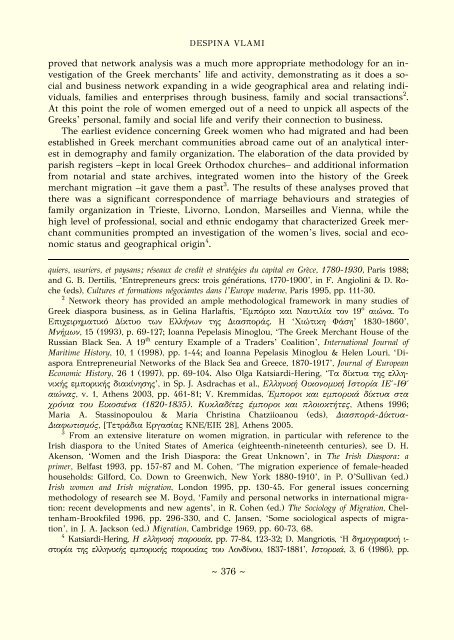You also want an ePaper? Increase the reach of your titles
YUMPU automatically turns print PDFs into web optimized ePapers that Google loves.
DESPINA VLAMI<br />
proved that network analysis was a much more appropriate methodology for an investigation<br />
of the Greek merchants’ life and activity, demonstrating as it does a social<br />
and business network expanding in a wide geographical area and relating individuals,<br />
families and enterprises through business, family and social transactions 2 .<br />
At this point the role of women emerged out of a need to unpick all aspects of the<br />
Greeks’ personal, family and social life and verify their connection to business.<br />
The earliest evidence concerning Greek women who had migrated and had been<br />
established in Greek merchant communities abroad came out of an analytical interest<br />
in demography and family organization. The elaboration of the data provided by<br />
parish registers –kept in local Greek Orthodox churches– and additional information<br />
from notarial and state archives, integrated women into the history of the Greek<br />
merchant migration –it gave them a past 3 . The results of these analyses proved that<br />
there was a significant correspondence of marriage behaviours and strategies of<br />
family organization in Trieste, Livorno, London, Marseilles and Vienna, while the<br />
high level of professional, social and ethnic endogamy that characterized Greek merchant<br />
communities prompted an investigation of the women’s lives, social and economic<br />
status and geographical origin 4 .<br />
quiers, usuriers, et paysans; réseaux de credit et stratégies du capital en Grèce, 1780-1930, Paris 1988;<br />
and G. B. Dertilis, ‘Entrepreneurs grecs: trois générations, 1770-1900’, in F. Angiolini & D. Roche<br />
(eds), Cultures et formations négociantes dans l’Europe moderne, Paris 1995, pp. 111-30.<br />
2 Network theory has provided an ample methodological framework in many studies of<br />
Greek diaspora business, as in Gelina Harlaftis, ‘Εμπόριο και Ναυτιλία τον 19 ο αιώνα. Το<br />
Επιχειρηματικό Δίκτυο των Ελλήνων της Διασποράς. Η ‘Χιώτικη Φάση’ 1830-1860’,<br />
Μνήμων, 15 (1993), p. 69-127; Ioanna Pepelasis Minoglou, ‘The Greek Merchant House of the<br />
Russian Black Sea. A 19 th century Example of a Traders’ Coalition’, International Journal of<br />
Maritime History, 10, 1 (1998), pp. 1-44; and Ioanna Pepelasis Minoglou & Helen Louri, ‘Diaspora<br />
Entrepreneurial Networks of the Black Sea and Greece, 1870-1917’, Journal of European<br />
Economic History, 26 1 (1997), pp. 69-104. Also Olga Katsiardi-Hering, ‘Τα δίκτυα της ελληνικής<br />
εμπορικής διακίνησης’, in Sp. J. Asdrachas et al., Ελληνική Οικονομική Ιστορία ΙΕ΄-ΙΘ΄<br />
αιώνας, v. 1, Athens 2003, pp. 461-81; V. Kremmidas, Έμποροι και εμπορικά δίκτυα στα<br />
χρόνια του Εικοσιένα (1820-1835). Κυκλαδίτες έμποροι και πλοιοκτήτες, Athens 1996;<br />
Maria Α. Stassinopoulou & Maria Christina Chatziioanou (eds), Διασπορά-Δίκτυα-<br />
Διαφωτισμός, [Τετράδια Εργασίας ΚΝΕ/ΕΙΕ 28], Athens 2005.<br />
3 From an extensive literature on women migration, in particular with reference to the<br />
Irish diaspora to the United States of America (eighteenth-nineteenth centuries), see D. H.<br />
Akenson, ‘Women and the Irish Diaspora: the Great Unknown’, in The Irish Diaspora: a<br />
primer, Belfast 1993, pp. 157-87 and M. Cohen, ‘The migration experience of female-headed<br />
households: Gilford, Co. Down to Greenwich, New York 1880-1910’, in P. O’Sullivan (ed.)<br />
Irish women and Irish migration, London 1995, pp. 130-45. For general issues concerning<br />
methodology of research see M. Boyd, ‘Family and personal networks in international migration:<br />
recent developments and new agents’, in R. Cohen (ed.) The Sociology of Migration, Cheltenham-Brookfiled<br />
1996, pp. 296-330, and C. Jansen, ‘Some sociological aspects of migration’,<br />
in J. A. Jackson (ed.) Migration, Cambridge 1969, pp. 60-73, 68.<br />
4 Katsiardi-Hering, Η ελληνική παροικία, pp. 77-84, 123-32; D. Mangriotis, ‘Η δημογραφική ι-<br />
στορία της ελληνικής εμπορικής παροικίας του Λονδίνου, 1837-1881’, Ιστορικά, 3, 6 (1986), pp.<br />
~ 376 ~



